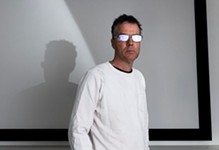Fall Films
By Shawn Badgley, Fri., Nov. 10, 2006

Darren Aronofsky on 'The Fountain'
"You're reckless," Ellen Burstyn's character tells Hugh Jackman's as they argue in the research lab where much of The Fountain's present-day narrative – one of its three – is set. "You're losing perspective."
An early moment in a film that famously covers a millennium in an hour and a half, it's nonetheless emblematic, both onscreen and off: The Fountain is burnished with photographed (as opposed to CGI) visual effects but occasionally stilted with a bygone literary grandeur. It's nearly overwhelmed by untethered plot points that barely come together to tell a sci-fi love story about the search for the fountain of youth. And Darren Aronofsky's third feature (Pi, Requiem for a Dream) faced adversity in both production – it would lose big names, running time, and about $40 million in budget – and immediate critical response. Some have attributed that adversity to what they believe to be the director's own issues with excess.
"Back-burnered four years ago after original star Brad Pitt pulled out, then long in the making, The Fountain ... made more of a splatter than a splash on Venice's Lido with its world premiere," wrote Variety's Leslie Felperin in September. "Greeted by booing at its first press unspooling, pic's hippy trippy space odyssey-meets-contempo-weepy-meets-conquistador caper ... suffers from a turgid script and bears all the signs of edit-suite triage to produce a still-incoherent 95 minutes. A gush of negative word of mouth will keep B.O. figures at a trickle."
Still standing upright and drawing breath later that month, Aronofsky was in Austin for Fantastic Fest, during which he answered some questions at the Driskill Hotel Bar. He was relaxed, expansive, and circumspect, concerned more with the fact that his sister Patti was in labor in New York City – and that he had to call Rachel Weisz, the mother of his child and the star of his film, to let her know – than he was with those who might tell him he's "not supposed to deal with the big issues," the ones who might rather we "go see our typical fare at the mall."
Austin Chronicle: How seriously do you take the notion of making art as opposed to playing with formula?
Darren Aronofsky: What do you mean, a formula?
AC: In terms of making Hollywood movies, conventional storytelling structure, for starters –
DA: With The Fountain, because it's told in a very different way, it seems like it's not formulaic, but actually it's very formulaic. And that's why I told it that way. I think it's a trick, and I did it on purpose, because it's really a very simple story. It's about a man and a woman deeply in love. That's the whole story. The woman has this great tragedy. She, Izzi, Rachel Weisz's character, is coming to terms with it, and Tom [Jackman's character] is doing the very typical thing of running away and denying it. There is no vocabulary in Western society, in America, for letting go with a positive connotation, with finding grace. ... It ends up splitting families apart, and these people end up dying even more alone.
That tension was somehow beautiful for me. Here, it's a heroic journey. It's a guy whose wife is dying; he's trying to save her. And he goes a long way, only to discover that there really is no place like home. But if you tell it that directly, it's a movie of the week. It might work emotionally well for a lot of people, but I wasn't really interested in doing something that straightforward. I've always been interested in pushing the limits of what cinema can hold and handle.
AC: It's a beautiful film, spectacular in spots. How would it have looked at $70 million as opposed to the $30 million it ended up at?
DA: I think people think it's a lot bigger, and the reason that it looks that way is just because we had a lot of time to prep. If Hollywood spent more time planning, movies would be a lot cheaper. I think a lot of times they get really expensive because they're rushed into production. There's a lot of cooks in the kitchen, and things are always in flux and being pulled in different directions. If you have a singular vision and spend the time to figure out the right way to make it, then things don't have to cost as much. Requiem was $4 million, and people always thought it was made for more.
AC: You spoke earlier about the narrative here to a large extent being built on a trick. How do you tell a story like that without losing the reins?
DA: I think it's dangerous. I think we're going to lose a lot of people, actually. ... But what I notice when I watch people watching the film is that they are watching. When you're dealing with these unanswerable questions, you just put it out there, and people have to take it into their own lives. They have to see how it fits into their own beliefs, their own religion, their own spirituality. ... That experience appeals to me more than the first scene you meet the hero; he endears himself to you; and, then, five minutes later, you realize he has a problem, and then the rest of the movie is him solving the problem. And, really, that's the formula in The Fountain, but it's just shaken up a little bit and makes you work. The film itself is a mystery; it's a puzzle.
AC: I think I'm going to choose to look at it as a story open to interpretation rather than as a jigsaw with a solution. It feels more authentic for me that way, given its subject matter.
DA: Well, I think it does work in several different ways, but there is one solution. As a filmmaker, my co-writer [Ari Handel] and me, we definitely had an opinion on how it fits together, but we knew people would interpret it in several different ways. I mean, you're dealing with love, death, and life. The only form that has dealt with that straight on is poetry. With poetry, everything is not spelled out, and everyone has their own response. So, maybe it's better to say that this is more of a poetic treatment.
The Fountain is scheduled to open in Austin on Nov. 22.








